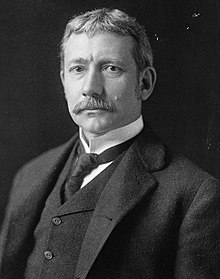
Back إليهو روت Arabic اليهو روت ARZ Eliu Rut Azerbaijani الیو روت AZB Эліу Рут Byelorussian Эліў Рут BE-X-OLD Илайхю Рут Bulgarian Elihu Root Catalan Elihu Root Czech Elihu Root Danish
Elihu Root | |
|---|---|
 Root in 1902 | |
| 38th United States Secretary of State | |
| In office July 19, 1905 – January 27, 1909 | |
| President | Theodore Roosevelt |
| Preceded by | John Hay |
| Succeeded by | Robert Bacon |
| 41st United States Secretary of War | |
| In office August 1, 1899 – January 31, 1904 | |
| President |
|
| Preceded by | Russell A. Alger |
| Succeeded by | William Howard Taft |
| United States Senator from New York | |
| In office March 4, 1909 – March 3, 1915 | |
| Preceded by | Thomas C. Platt |
| Succeeded by | James Wadsworth |
| United States Attorney for the Southern District of New York | |
| In office March 12, 1883 – July 6, 1885 | |
| President | Chester A. Arthur Grover Cleveland |
| Preceded by | Stewart L. Woodford |
| Succeeded by | William Dorsheimer |
| Personal details | |
| Born | February 15, 1845 Clinton, New York, U.S. |
| Died | February 7, 1937 (aged 91) New York City, U.S. |
| Political party | Republican |
| Spouse | Clara Wales |
| Relations | Oren Root II (brother) |
| Education | Hamilton College (BA, MA) New York University (LLB) |
| Signature | |
Elihu Root (/ˈɛlɪhjuː ˈruːt/; February 15, 1845 – February 7, 1937) was an American lawyer, Republican politician, and statesman who served as the 41st United States Secretary of War under presidents William McKinley and Theodore Roosevelt and the 38th United States Secretary of State under Roosevelt. In both positions as well as a long legal career, he pioneered the American practice of international law. Root is sometimes considered the prototype of the 20th-century political "wise man", advising presidents on a range of foreign and domestic issues.[1] He also served as a United States Senator from New York and received the 1912 Nobel Peace Prize.
Root was a leading New York City lawyer who moved frequently between high-level appointed government positions in Washington, D.C., and private-sector legal practice in New York. He headed organizations such as the Carnegie Endowment for International Peace and the American Society of International Law.
As Secretary of War from 1899 to 1904, Root administered colonial possessions won in the Spanish–American War. Root favored a paternalistic approach to colonial administration, emphasizing technology, engineering, and disinterested public service. He helped craft the Foraker Act of 1900, the Platt Amendment of 1901, and the Philippine Organic Act (1902).[2] Root also modernized the Army into a professional military apparatus with a general staff, restructured the National Guard, and established the U.S. Army War College.
Root returned to the Roosevelt administration as Secretary of State from 1905 to 1909. He modernized the consular service by minimizing patronage, maintained the Open Door Policy in China, promoted friendly relations with Latin America, and resolved frictions with Japan over the immigration and treatment of Japanese citizens to the West Coast of the United States. He negotiated 24 bilateral international arbitration treaties, which led to the creation of the Permanent Court of International Justice.[3][4]
As a United States Senator from New York, Root was a conservative supporter of President William Howard Taft, playing a central role in Taft's nomination to a second term at the 1912 Republican National Convention. By 1916, he was a leading proponent of military preparedness with the expectation that the United States would enter World War I. President Woodrow Wilson sent him to Russia in 1917 in an unsuccessful effort to establish an alliance with the new revolutionary government that had replaced the Czar.[5] Root supported Wilson's vision of the League of Nations but with reservations along the lines proposed by Republican senator Henry Cabot Lodge.
- ^ Akiboh, Alvita. "'No anecdotes are told of Elihu Root': America's Twentieth Century Wise Man". U.S. History Scene. Retrieved April 5, 2020.
- ^ Robert Muccigrosso, ed., Research Guide to American Historical Biography (1988) 3:1329–33
- ^ Cross, Graham (2012). The Diplomatic Education of Franklin D. Roosevelt, 1882–1933. New York, NY: Palgrave Macmillan. p. 71. ISBN 978-1-137-01453-5.
- ^ Muccigrosso, ed., Research Guide to American Historical Biography (1988) 3:1330
- ^ "Tells How Allies Failed in Russia: Col. Robins Says Boastful American Propaganda Led Russian Army to Quit; Root Mission Knifed Here" (PDF). The New York Times. March 7, 1919. p. 18.
© MMXXIII Rich X Search. We shall prevail. All rights reserved. Rich X Search